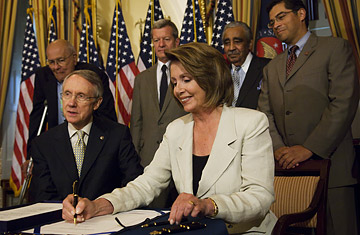
Senate majority leader Harry Reid and House Speaker Nancy Pelosi, with House Energy chairman John D. Dingell, Senate Finance chairman Max Baucus, House Ways and Means chairman Charles B. Rangel and assistant to the Speaker Xavier Becerra
Just because their approval ratings are at all-time lows and they are dismissed as a do-nothing Congress doesn't mean Democrats on Capitol Hill aren't keeping busy. On the contrary, since they took control of both legislative chambers in 2006, party leaders have devoted a lot of time and energy passing bills, on everything from global warming and children's health care to embryonic-stem-cell research and a windfall tax on oil companies. Now it's true that they knew their efforts were in vain — that their bills either had no chance of passing, or they would force President Bush to deliver on his veto threat, as he has done twice on legislation to expand the State Children's Health Insurance Program (SCHIP). But in some respects, that's beside the point — because in the middle of an election that looks to make the Dems' hold on power even stronger, much of this Congress's work is really more about laying the foundation for next year. "Some of these things are like spring training, you know, that the real game is going to be played next year," says Senator Byron Dorgan, a North Dakota Democrat.
A lot will depend, of course, on who wins the presidency. But regardless, at least two measures are sure to see votes: the children's health program and the No Child Left Behind Act, both of which will expire without congressional action (No Child Left Behind actually expires in September, but it's likely that another extension will be passed). Both, also, are stepping-stones to two major campaign issues: education reform and universal health care.
"It's very obvious on some of the biggest domestic issues, health care and energy, the American people want a much bolder response than is possible to enact in this Congress," says Senator Ron Wyden, an Oregon Democrat. "So what we have done is essentially have a two-track strategy: one to get as much done in this Congress, and then hopefully we lay a bipartisan track for next year, when there'll be an opportunity to take a bolder approach."
Traditionally, the first two years of any new presidency are the most productive in terms of legislation. In his first term, Bush used his political capital to pass the Medicare Prescription Drug Program, No Child Left Behind, the Patriot Act and tax cuts. In 1993 Clinton passed the Family and Medical Leave Act, the Brady Handgun Bill and the "Don't ask, don't tell" policy, and he created AmeriCorps. If Senator Barack Obama wins, this would be the first time that Democrats control both branches of government since the Clinton era, and the potential (and pressure) to complete lots of unfinished legislative business greatly increases.
Even if Senator John McCain wins the presidency, more legislation would likely be enacted; not only does the Republican agree with Democrats on key issues such as global warming, immigration and stem-cell research, but he has spent nearly three decades in the Senate. McCain has said that if elected, he would move to pass $1 trillion in corporate tax cuts and make Bush's income tax cuts permanent, cut wasteful government spending and pass a gas tax holiday, and seek to allow offshore drilling to help ease the energy crisis — almost none of which has support from Democrats. Obama has said he would pass two new economic stimulus packages, move to end the war in Iraq and shore up the Veterans Administration — all goals congressional Dems support.
There are also the perennial issues that the next Administration must deal with, such as the budget and supplemental war funding (which, if McCain wins, will be one of the most contentious measures). Two other annual thorns — Band-Aid fixes for a middle-class tax hike known as the alternative minimum tax and an ever growing increase in fees paid by Medicare to doctors — could see permanent solutions next year, though such moves would require a serious look at the tax code and reforming entitlements, both tall orders. "These are big problems. I think these are core policy issues, and having them out there so the public understands and can help build momentum to get these things done is critically important," says Senator Maria Cantwell, a Washington State Democrat. "It helps show the public who's for and against things, so it helps us shape the debate at the presidential level too."
Given the logjam that has built up since Democrats took control of Congress in 2006, there's a lot to get through. Rather than jumping into the basket of smaller existing bills, like SCHIP and the windfall tax on oil companies, lawmakers should take this opportunity to go slowly and look at big solutions, says Thomas Mann, a presidential scholar at the Brookings Institution. "I would urge a President Obama or McCain to just forget the whole idea of a first 100 days," he says. "We face mega-problems, and they can't be rammed through in a brief period of time. They'd be much better to take their time and achieve some real change." But given Congress's already low approval numbers and the legislative gridlock of the past few years, it will be hard for leaders on Capitol Hill to be patient, especially with so much low-hanging fruit at hand.
Three other time-sensitive large items remain to be finished this year by Congress: a housing bill that Bush has now, after initially threatening a veto, agreed to sign; reauthorization of the Federal Aviation Administration; and a yearly extension of popular bipartisan corporate tax cuts. If any of these bills don't make it into law, they too will take priority next year.
— With reporting by James Downie / Washington
